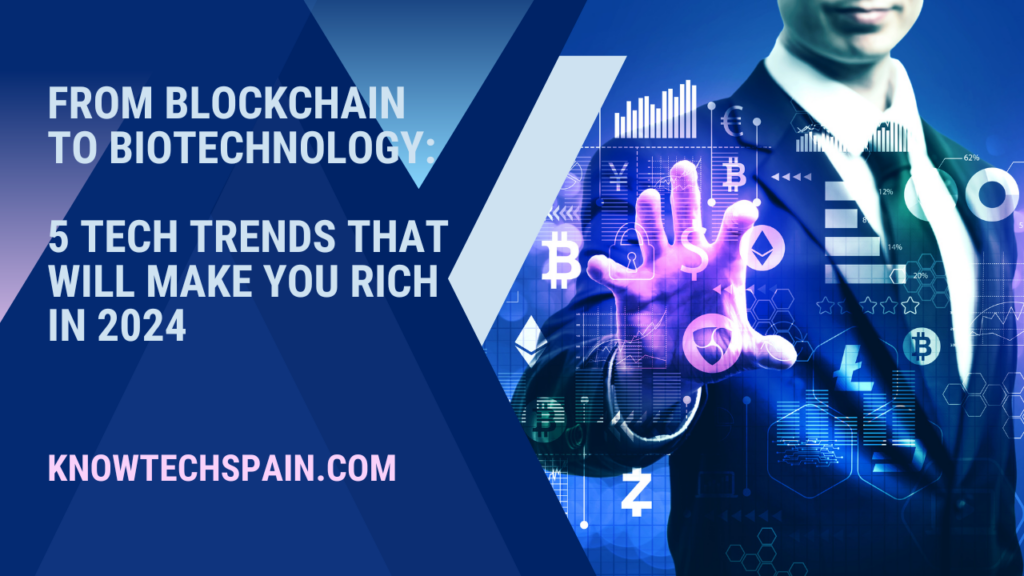From Blockchain to Biotechnology: 5 Tech Trends That Will Make You Rich in 2024
I. Blockchain: Beyond Cryptocurrency
A. Smart Contracts and Decentralized Finance (DeFi)
Blockchain isn’t just about Bitcoin anymore! Smart contracts are changing the game in finance. These self-executing contracts cut out middlemen, making transactions faster and cheaper. I remember when I first used a DeFi platform to lend some crypto – it was so simple, and the interest rates were way better than my bank’s!
B. Non-Fungible Tokens (NFTs) in Various Industries
NFTs are spreading beyond digital art. They’re making waves in real estate, music, and even sports memorabilia. My friend just bought the rights to a virtual plot of land in a blockchain-based game – who would’ve thought virtual real estate could be a thing?
C. Blockchain in Supply Chain Management
Blockchain is making supply chains more transparent and efficient. Imagine being able to trace your coffee from the farm to your cup! Companies are using this tech to reduce fraud and ensure product quality.
II. Artificial Intelligence and Machine Learning
A. AI in Healthcare: Diagnosis and Drug Discovery
AI is becoming a doctor’s best friend. It’s helping to spot diseases earlier and even design new medicines. I was amazed when my local clinic started using an AI system to analyze X-rays – it’s like having a super-smart assistant for the doctors!
B. Natural Language Processing and Conversational AI
Chatbots are getting smarter by the day. They’re not just for customer service anymore – they’re writing articles, analyzing sentiment, and even helping with coding. I’ve been using an AI writing assistant lately, and it’s like having a brainstorming buddy available 24/7.
C. AI-Powered Predictive Analytics for Business
Businesses are using AI to predict trends and make smarter decisions. From forecasting sales to predicting equipment failures, AI is giving companies a crystal ball to peer into the future.
III. Biotechnology and Genetic Engineering
A. CRISPR Gene Editing Applications
CRISPR is like a genetic scissors, allowing scientists to edit DNA with incredible precision. It’s opening up possibilities for treating genetic diseases that were once thought incurable. I’m personally excited about the potential for using CRISPR to create crops that are more resistant to climate change.
B. Personalized Medicine and Gene Therapy
Imagine medicine tailored just for you, based on your unique genetic makeup. That’s the promise of personalized medicine and gene therapy. It’s not science fiction anymore – these treatments are already helping people with rare genetic conditions.
C. Synthetic Biology and Bio-Manufacturing
Scientists are now designing and building new biological parts, devices, and systems. It’s like genetic Lego! This could lead to new ways of producing materials, from biodegradable plastics to lab-grown meat. I tried a lab-grown chicken nugget recently, and honestly, I couldn’t tell the difference!
IV. Quantum Computing
A. Quantum Computing in Financial Modeling
Quantum computers can crunch numbers in ways that make traditional computers look like abacuses. They’re set to revolutionize financial modeling, potentially making market predictions more accurate than ever before.
B. Quantum Cryptography and Cybersecurity
As quantum computers get more powerful, they pose a threat to current encryption methods. But don’t worry – quantum cryptography is here to save the day! It uses the principles of quantum mechanics to create unbreakable codes.
C. Quantum Sensors and Imaging Technologies
Quantum sensors could make MRI scans more detailed, help self-driving cars ‘see’ better, and even detect underground resources more accurately. It’s like giving our current sensing technologies superpowers!
V. Internet of Things (IoT) and Edge Computing
A. Smart Cities and Infrastructure
IoT is making our cities smarter. From traffic lights that adjust based on real-time traffic to smart energy grids that reduce waste, IoT is helping cities run more efficiently. I love using the smart parking app in my city – no more driving in circles looking for a spot!
B. Industrial IoT and Predictive Maintenance
Factories are getting smarter too. IoT sensors can predict when a machine is likely to break down, allowing for maintenance before a costly failure occurs. It’s like giving machines a health check-up!
C. Edge AI and Real-Time Data Processing
Edge computing brings AI closer to where data is generated. This means faster responses and less reliance on cloud connections. Imagine your smart home devices making decisions instantly, without having to consult the cloud!
VI. Summary: The Convergence of Technologies
These technologies aren’t developing in isolation. They’re converging and amplifying each other’s effects. For example, AI and quantum computing could work together to solve complex problems in biotechnology. The future is not just about individual technologies, but how they work together to create new possibilities.
VII. FAQs
- How can I invest in these tech trends?
You can invest in ETFs focused on specific technologies, buy stocks of companies leading in these fields, or even invest directly in startups through crowdfunding platforms.
- What skills will be in demand for these technologies?
Programming, data analysis, and bioengineering skills will be crucial. But don’t forget about soft skills like critical thinking and creativity – they’ll be essential for applying these technologies in innovative ways.
- Are there any risks associated with these trends?
Yes, like any new technology, there are risks. These range from privacy concerns with AI and IoT to potential misuse of gene editing technology. It’s important to consider the ethical implications as these technologies develop.
- How will these technologies impact job markets?
While some jobs may become automated, these technologies will also create new job opportunities. The key is to stay adaptable and keep learning.
- What industries are likely to be disrupted by these trends?
Healthcare, finance, manufacturing, and agriculture are just a few industries that could see major changes. But really, it’s hard to think of an industry that won’t be affected in some way!


